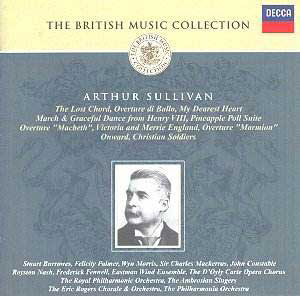Decca’s British Music Collection series is reissuing
a wealth of interesting music by British composers from, viewed alphabetically,
Arne to Warlock and this example, featuring Sullivan, is no exception.
It largely bypasses "Gilbert & Sullivan", though Pineapple
Poll draws its tunes from various Savoy operas. The presence of
the three vocal items might suggest an element of miscellaneity about
the programme.
It was perhaps a pity that a recording of the glorious
In Memoriam overture, if such does exist in Decca’s vaults, did
not replace The Lost Chord and Onward Christian Soldiers.
Nicely though Stuart Burrows sings the former, the presence of an
accompanying choir does not add anything to it, while the arrangement
of the latter, by Eric Rogers, presumably the Eric Rogers who provided
much of the music for the Carry On Films, is overblown, almost
a send-up, if not indeed (for me) a wind-up. Not everyone will remember
Felicity Palmer as a soprano but her committed account of My Dearest
Heart will give pleasure.
There are other items to take pleasure in here. The
Henry VIII excerpts, Victoria and Merrie England and the
Macbeth and Marmion overtures were all LP fillers when
d’Oyly Carte (the "old" d’Oyly Carte, as I suppose we must
now describe them) re-recorded the Savoy operas for Decca in the 1970s.
Royston Nash, who conducts the RPO, was then Musical Director of d’Oyly
Carte and his performances of these (quite extensive) excerpts are more
than acceptable.
Victoria and Merrie England (1897) was a ballet
composed to mark the Queen’s Diamond Jubilee and drew on a much earlier
ballet L’Ile Enchantée – though late in Sullivan’s career
it is thoroughly characteristic. Sir Walter Scott’s influence on music,
British and foreign, during the 19th Century is a subject
worthy of detached treatment. Britain played a full part in this with
musical plays, called operas by composers like John Parry, J Whitaker,
Charles Horn, Thomas Cooke, John Davy and Henry Bishop as early as the
1810s and 1820s, and later on in the century Sullivan contributed mightily
in that direction. The Marmion overture (1878) pre-dated, his
opera Ivanhoe by upwards of a dozen years. Macbeth (1888),
for a Henry Irving production of "the Scottish play", is even
finer. The CD insert suggests Verdi as an influence and certainly he
is there, along with others (Sullivan was one of the great eclectics
of musical history while still showing a very personal style), but for
me Mendelssohn is the major influence both in scoring and the shape
of the melodies.
Perhaps the finest on the disc and worth the whole
cost on its own is Sir Charles Mackerras’s 1982 performance of the delicious
Overture di Ballo, which again owes much to Mendelssohn in its
instrumentation, although there is also a lot of French influence there
too. Mackerras, of course, had a hand 51 years ago in the disc’s last
item, a suite from the ballet Pineapple Poll, as he arranged
the music, from various G&S snippets. This, is an arrangement for
wind band by W J Duthoit and played by the superb Eastman Wind Ensemble.
This brings a generally recommendable disc to a cheerful conclusion.
Finally, four points to make on presentation. First,
the insert does not give any indication of what the individual movements
of the Victoria & Merrie England suite are about. Second,
my eyebrows raised when the list of contents stated that the d’Oyly
Carte Chorus was to take part in the orchestral Henry VIII excerpts
– you may be assured they do not! Third, while other volumes in this
series are stated, and properly so to be devoted to music by Sir
John Stainer and Sir Henry Rowley Bishop, this one is headed
"Arthur Sullivan" with no "Sir". However the booklet
prints all the words of the three vocal items.
Philip L Scowcroft


![]() See
what else is on offer
See
what else is on offer 